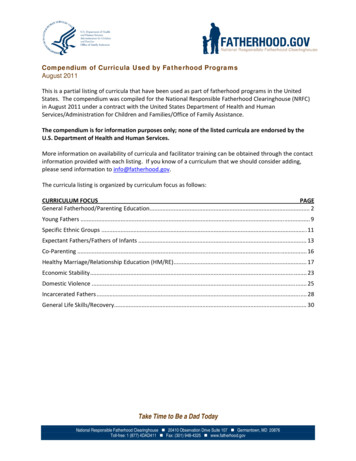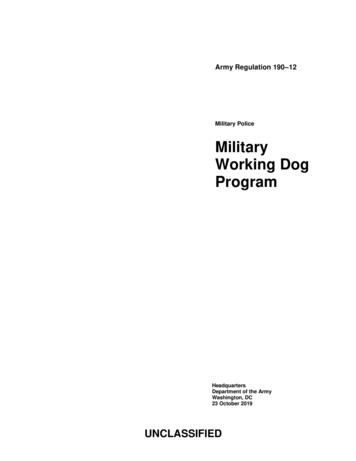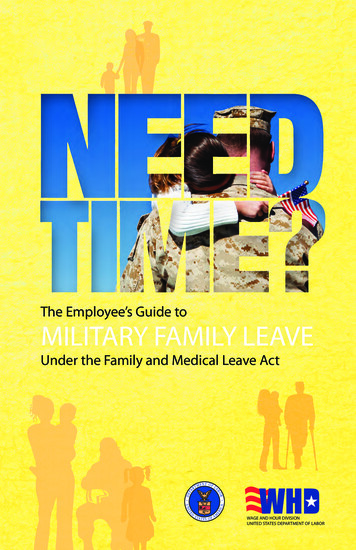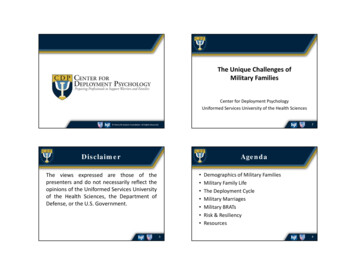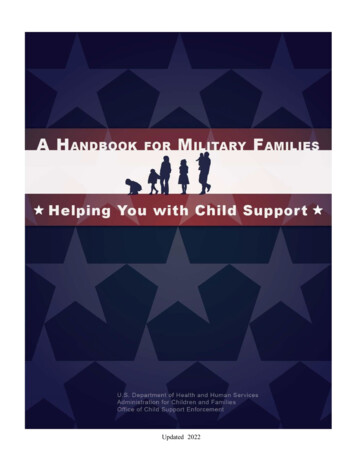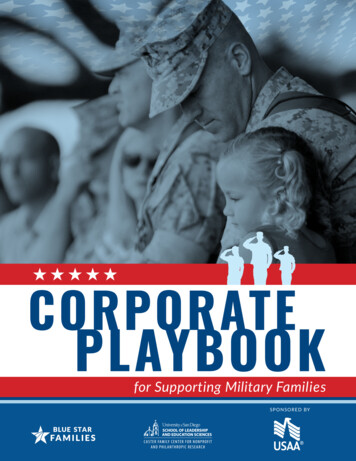
Transcription
Welcome to the NRFC WebinarSupporting Military Families:Services and Resources for Active Duty and Veteran Fathers2:00 – 3:30 p.m. EDT December 13, 2017All audio from today’s session will be broadcast through thecomputer. Make sure your computer volume and) are turned on.Adobe Connect audio (
Questions for the PresentersPlease enter anyquestions in theQ&A box at thebottom-right ofyour screen.
National Responsible FatherhoodClearinghouse National resource to supportfathers and families. Funded by U.S. Department ofHealth and Human Services,Administration for Childrenand Families, Office of FamilyAssistance. Resources are available forfatherhood practitioners,dads, researchers, and policymakers.
National Responsible Fatherhood ClearinghouseVisit us: www.fatherhood.govwww.fatherhood.gov/toolkit for Responsible Fatherhood Toolkit.www.fatherhood.gov/webinars for archives of all our webinars.Contact: info@fatherhood.govEncourage fathers or practitioners tocontact our Helpline toll-free at:1-877-4DAD411 (877-432-3411)Engage with us via social media:Facebook - /FatherhoodgovTwitter - @FatherhoodgovJohn Allen, Contracting Officer’sRepresentative (COR) for NRFC- john.allen@acf.hhs.govKenneth Braswell, NRFC Project Director- kenneth.braswell@gmail.comPatrick Patterson, NRFC Project Manager- patrick.patterson@icf.com
Today’s Webinar Will Provide Overview of challenges faced by military fathers and their families. Information and tips to support military families from:Jennifer DiNallo, Ph.D. Clearinghouse for Military Family Readiness, Pennsylvania State University, StateCollege, PAKatrina Johnson Horizon Outreach, Houston, TXDaniel Romero Social Advocates for Youth, Military Family Resource Center, San Diego, CA List of helpful resources available for download during the webinar. “Question and Answer” session with the presenters at the end ofthe webinar.
Supporting Military Families:Services and Resources for ActiveDuty and Veteran FathersJennifer DiNallo, Ph.D.PHOTODirector of ResearchClearinghouse for Military Family ReadinessThe Pennsylvania State UniversityDecember 13, 2017
Clearinghouse forMilitary Family ReadinessMission To engage in applied research and evaluation, implementation science,education, and outreach to advance the health and well-being of Militaryfamilies.Vision To ensure U.S. Military families are supported by practices and programs knownto be effective based on science and evidence, and implemented in order toenhance their readiness and overall well-being. Interactive web-based platform involving the selection, dissemination, andevaluation of evidence-based or evidence informed programs and practices tohelp professionals make informed decisions regarding how best to serve Militaryfamilies.
Developed from a Partnership Established seven years ago at Penn State University 20 million in funding and still growing(80 faculty & rgradInternsPart-timestaff
Military Family Readiness: Being prepared to effectively navigate the challenges of dailyliving experienced in the unique context of military service. Being equipped with the skills to competently function in the faceof challenges. Being aware of the supportive resources available. Knowing how to utilize these skills and supports when managingchallenges. Ready Families contribute directly to the Service Member's stateof readiness to accomplish the mission at hand.
What does the Clearinghouse forMilitary Family Readiness do? Program placement and fact sheet development Evaluability assessments and evaluation planning Research Program development, implementation, and evaluation Learning design and curriculum development
Not Just a Website Provides connections with professionals through activepartnerships involving quality technical assistance andproactive problem-solving. Offers continued capacity-building opportunities forprofessionals assisting Military families. Presents the facts on the evidence of existingprograms. Program search and fact sheet presentation.
How Do We Define a Program? A component or collection of components related to aspecific topic. Must have a manual to guide practitioners inimplementation in the manner in which it was designed. For example:o A program using education-based strategies will include acurriculum.o A program using environmental-modification strategies willinclude a plan for modifying the environment.
Evaluating The Evidence:Continuum of Evidence
Contact InformationJennifer DiNallo, Ph.D.Director of ResearchClearinghouse for Military Family ReadinessThe Pennsylvania State du
Supporting Military Families:Services and Resources for ActiveDuty and Veteran FathersKatrina R. Johnson, EMBAPHOTOPresident/CEOU.S. Air Force VeteranHorizon OutreachDecember 13, 2017
Horizon Outreach Overview Non-profit 501(c)3 organization Founded in February 2010 for the charitable purpose of preventing and endinghomelessness among military and non-military families. As a veteran-owned organization, we know firsthand thechallenges faced by military veterans. Our mission “Giving Everyone A New Start.” Since 2010 We have connected over 4,500 individuals and families to resources and supportiveservices in the community. 2,000 were military veterans (served by our Horizon Eagle program). Through direct services and collaborative partnerships, we linkthose in need to: food, clothing, medical screenings, housing,employment services, and other resources.
Challenges for Military FamiliesNeeds of Active Duty and Veteran FathersSense of Community55Family Reunification & Support41Employment40Housing40Mental Health35Supportive Services30Substance Abuse250102030405060
Transitioning from Militaryto Civilian LifeFrom Employedto Deployed to Unemployed to Homeless
HomelessnessAlthough accurate counts are difficult, estimates indicate:39,471veterans arehomeless on anygiven night in theUnited States. Despite a 45%decline innumbers from2010 to 2017.*1 in 5homeless menare veterans.**1.4 million45%veterans are at riskof becominghomeless due topoverty, lack ofsupport networks,dismal livingconditions, and lackof permanentsupportive housing.**of homelessveterans areAfrican Americanor HispanicMales.** Most of the homeless veteran fathers served by Horizon Eagle program arenon-custodial fathers.*The 2017 Annual Homeless Assessment Report (AHAR) to Congress (Dec. 2017). U.S. Dept. of Housing and Urban Development.**2016 PIT Estimate of Homeless Veterans by State (2016). U.S. Dept. of Housing and Urban Development; National Coalition for Homeless Veterans (2017).
Mental Health, Substance Abuse, andPhysical Health Issues Estimates are that 12-20% of veterans returning from the wars in Iraq andAfghanistan have symptoms of Post Traumatic Stress Disorder (PTSD).1 Although evidence is unclear in terms of divorce rates, research indicatesan increase in reports of marital dissatisfaction due to multipledeployments.2 70% of homeless veterans have substance problems; 51% have disabilities.3Suicide Rate: 20 veterans a day commit suicide, based on data from Department ofVeteran Affairs.4 Veterans account for 20% of U.S Suicides.5Sources: (1) U.S. Dept of Veteran Affairs: National Center for PTSD (2016); (2) RAND Corporation (2016); (3) SAMHSA (2014) and National Coalition forHomeless Veterans; (4) Military Times (2016); (5) George Washington University (2015).
Lack of Support NetworksInability to Access Services Due to lengthy deployments, fathers are oftendisconnected from their families. Families often feel isolated. Can be hard to access mainstream services. May feel overwhelmed with process requiredto access services. May face transportation issues. Discharge Classification has an impact.
Locating Sustainable Employment– Transitioning Military Skills Most of the fathers we serve at Horizon Outreach have adifficult time finding sustainable long-term employment. Military careers result in specialized skillsets that may not beeasily transferable. Veterans often need retraining for civilian employment. Many veterans have trauma issues that need to beaddressed. This is a priority for our work at HorizonOutreach.
Services Provided By Horizon Outreachthrough our Horizon Eagle program Priority Services for Active Duty/Veteran Fathers: Active Duty and Veteran Fathers provided with priority enrollment. Assigned Case Manager who works specifically with military families. Assessment for Trauma – Link to Service Providers. Immediate Linkages to Housing/Training Services: SSVF (Supportive Services for Veteran Families)Housing Assistance(homeless veteran families) Educational Opportunities Career Development/Job Training Programs
Services Provided By Horizon Outreach(cont.) Quarterly VA Disability Claims/Housing Seminars Referrals to Veteran service organizations to represent Veterans withtheir Disability Claims. Referrals to partner Veteran organizations. ID Assistance Legal Aid Assistance Peer Mentors – Referrals Clothing Assistance Food Assistance
Tips for Engaging Active Duty Militaryand Veteran Fathers Offer an environment that promotes Camaraderie and Inclusion. Partner with agencies that serve fathers and/or offer relevantservices. Provide assistance in applying for Veteran Claims, Vocational RehabServices, and Housing Assistance. Utilize Peer Support Mentors. Offer Family Retreats and activities focused on Family Reunificationand Conflict Resolution. Provide Engaging Services, Employment Assistance, CareerReadiness, and Linkages to Mainstream Services.
Contact InformationKatrina R. JohnsonPresident/CEOU.S. Air Force VeteranHorizon reach.org
Supporting Military Families:Services and Resources for ActiveDuty and Veteran FathersDaniel RomeroPHOTOSenior Program DirectorSAY San Diego, CADecember 13, 2017
Social Advocates for Youth (SAY)San Diego, CA. Founded in 1971 with prevention services for struggling youth Now, 30 programs to strengthen whole child, whole family, wholecommunity. Military-specific interconnected programs: Dads Corps (formerly “Dads on Duty”) Playgroups Military Family Resource Center Parent Empowerment Academies First 5, First Steps Health and Wellness Programs Mix of civilian and military participants leads to differentenvironments, but can be extremely beneficial for ALL. Provide strengths based approach and trauma informed care.
Work with Military Families Common perspective of military: hard working, dedicated, organized, disciplined, intelligent “Military” Unique culture (language, acronyms, hierarchy, etc.) Sample Needs of Active Duty Families: Single-parent householdsChildcare challengesQualification for basic needs programs (BAH-Basic Allowance for Housing)Lack of support systems/Social Isolation Sample Needs of Veteran Families: Assimilation to “Civilian Life”Access to resourcesLack of camaraderie or “brotherhood”Loss of identityCross-walking employment
Challenges to Consider Community Make-Up Military-Focused communities: many resources, duplication of servicesSmall Town communities: few resources to connect with military familiesMetropolitan areas: can be difficult to identify clients for servicesOverseas communities: language, cultural barriers in supporting families Transitions 2-4 year cycle is a part of life for many military families Changes in schools for children Transition to civilian life often challenging Social Isolation High spouse unemployment Childcare issues
Other Factors to ConsiderWhen Working with Military Families Language Matters Avoid “trigger words” or language that connotes weakness or opinion “Support” vs. “Help”/“PTSD”/“Where are you from?”/“Sir”/“Time Telling” Perception vs. Reality: “on-base supports” vs. “civilian resources” Importance of word of mouth: clients’ sharing positive experiences can boost recruitment Gain credibility by “showing up”
Other Factors to ConsiderWhen Working with Military Families (cont.) Shared experiences create opportunities - Peer Navigationand Peer Support Courage2Call (San Diego hotline) Zero8hundred (transition to civilian life, San Diego) Assess all factors (environmental and internal) Avoid making assumptions, problems don’t just come from combat. Mental Health First Aid Treat clients with dignity while supporting their families Don’t treat clients and their families as “experiments.”
Questions to Answer Before StartingYour Fatherhood Program How will you handle client deployments and transitions? How will you connect clients to vital resources? What kind of culture will your program create? How will you establish “common ground” for each cohort ofindividuals? Will you keep members connected following classes? How can you offer support to help a family gain stability? How might other programs be weaved into your program design?
Creating Your Fatherhood Initiative Draw on the needs of military fathers:For Active Duty fathers, timeis precious:For Veteran fathers, selfidentification is important: Who can you engage in familyunit? Spouse/Partner? Youth? You need to be present within thecommunity landscape. Connect to Command Leadershipor other “Key Connectors” to moveyour message forward. Re-create a sense of communityand connection to community. Consider commitments at homeand how you can bring in keyprogram supports (childcare andfood).
Creating Your Fatherhood Initiative Be a connector Understand fathers may need other supports before they engagewith your services. Incorporate “service” into program design Volunteering is a key component in career progression in theservice. It can be a way to build community.
Building Your Fatherhood Initiative Tackle the work together – build a collective impact On-base resource providers (childcare and food can’t always be provided) Provide a forum to learn about the community’s needs For example: San Diego Military Family Collaborative and San Diego VeteransCoalition Rally around “Service gaps” Financial/Basic Needs Legal Support Childcare Housing Health Employment Preschool Parenting Special Needs Children Look for unlikely partners Theater groups Child Welfare Services Housing groups Youth groups Churches
Most Importantly Find ways to elicit participants’ thoughts and opinions as a feedbackmechanism. Empower participants by giving them roles and purpose. Continue to innovate to better meet clients’ needs. Stay attuned to changing dynamics in your community. Educate and train staff, volunteers, and participants withinformation about relevant resources, current events, and othervital information. HAVE FUN!
Resources Mental Health First Aid An 8-hour course for professionals (e.g., police officers, human resourcedirectors, primary care workers), and others interested in learning aboutmental illness and addiction. Military One Source Parenting and relationship resources for military families. Blue Star Families Annual Military Family Lifestyle Survey Resiliency during deployments: FOCUS and United Through Reading PsychArmor Institute Free online education and support for those who work with, live with, orcare for military service members, Veterans, and their families.
Contact InformationDaniel RomeroSenior Program DirectorSAY San Diegodromero@saysandiego.orgwww.saysandiego.org
Q&APlease enter any questions in the Q&A box at thebottom-right of your screen.
Contact Us NRFC: info@fatherhood.gov Comments, questions, suggestions for future webinartopics, information or resources that you recommend. Today's presenters: Jennifer DiNallo: jmd422@psu.edu Katrina Johnson: kjohnson@horizonoutreach.org Daniel Romero: dromero@saysandiego.org
To engage in applied research and evaluation, implementation science, education, and outreach to advance the health and well-being of Military families. Vision To ensure U.S. Military families are supported by practices and programs known to be effective based on science and evidence, and implemented in order to
